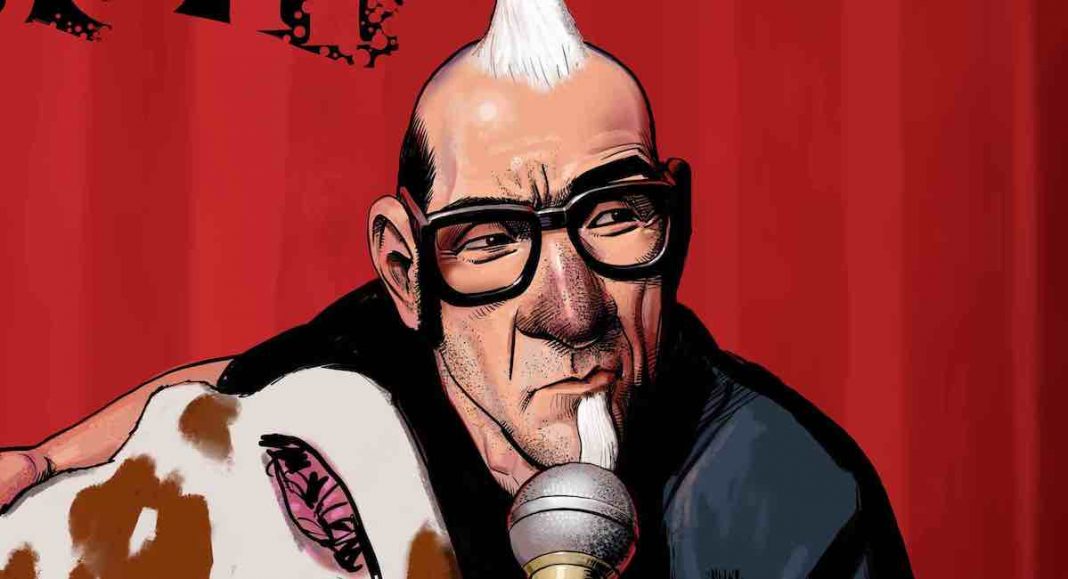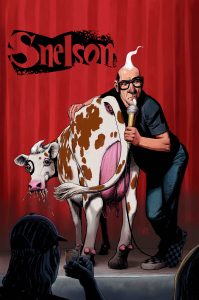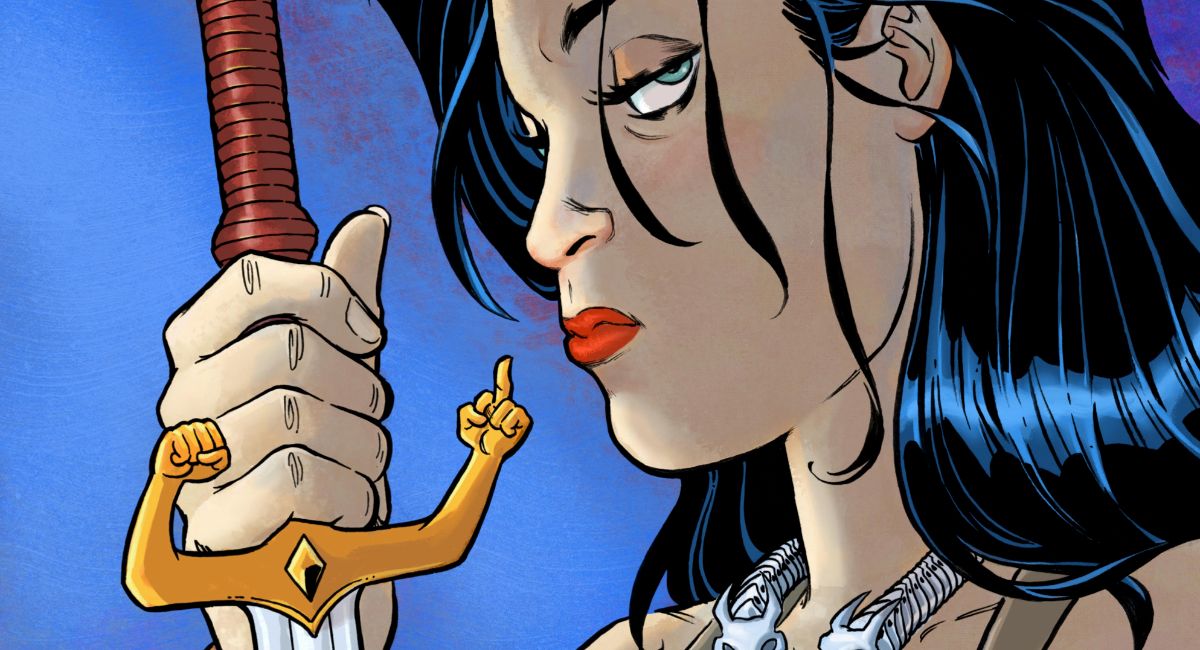Melville Snelson is finally getting the attention he’s always wanted. After debuting in a series of backup stories in Hashtag: Danger, Snelson is now set to headline his own five-issue miniseries from AHOY Comics. Snelson: Comedy is Dying is the creation of writer Paul Constant and artist Fred Harper, who are joined by colorist Lee Loughridge and letterer Rob Steen for the series. The new story picks up where the backup tales left off, with Snelson, a comedian who peaked in the ’90s, having finally found relevance again after gaining a new fanbase online. So what if those fans are all part of the alt-right?
For Constant, Snelson: Comedy is Dying is his latest series for AHOY Comics, after 2019’s Planet of the Nerds, the first title from the publisher to be optioned for big-screen adaptation. The Beat chatted with Constant about the genesis of Snelson, writing a series with an unlikeable protagonist, and name-checking Bari Weiss.
Joe Grunenwald: Who or what inspired the creation of Melville Snelson? Is he a character you’ve been developing for a long time?
Paul Constant: I’ve been writing professionally on the internet since the heyday of blog culture—so, 2006, 2007. And I’ve always had a sick fascination with trolls and the way that people are activated and radicalized by online communities. And in the last fifteen years, as internet culture has moved onto social media, that sickness has only accelerated. Like many Comics Beat readers, I’ve watched comics fans my age and demographic—white, middle-aged men—tip over into racist, sexist, and even fascist ideologies.
Writing is how I figure things out, and so I created Snelson as a thought experiment: What if, like many of my former high school classmates on Facebook, I believed I had peaked in the 1990s? What if my nostalgia for a perfect past that never actually existed caused me to hate the modern world? Once that frame was in mind, Snelson basically popped up, fully formed: A stand-up comedian who almost hit it big in the 1990s but who has spent the last 25 years on the downward slope of fame. Rather than accept his failures and try to grow, Snelson has decided to blame everyone else for his self-sabotage.
Once I had the particulars of Snelson’s past and personality nailed down, I realized I could use him to comment on and satirize a lot of modern-day sacred cows—podcast culture, memoirs as self-help books, the complete failure of websites to rein in bad behavior that has real-world consequences.

Grunenwald: To say that Snelson is a deeply flawed person feels like an understatement. He’s pretty bad in the back-up stories, and it sounds like he’s just going to get worse. Is it challenging to write stories with an unlikable lead? How do you balance that with still making a book you want non-terrible people to read and enjoy?
Constant: It is a huge challenge to write an unlikable lead. Like I said, I wanted to understand how someone becomes an embittered troll—but I absolutely do not want to make trolls sympathetic. Snelson is not the hero of this book, and I have a huge responsibility to ensure that I don’t glamorize him or endorse his beliefs in any way. If a reader were to send me an email saying “Snelson is my hero,” in the way that some misanthropic fans have unironically embraced The Joker or Thanos or Walter White as heroes, I would feel like I failed at my job.
As to why people would want to read and enjoy this book: I hope that there are readers out there, like me, who look around at, say, radicalized hate groups in comics fandom and wonder to themselves, “what the hell is going on here? How did this happen?” There’s not a whole lot of political satire in comics these days, and I think that’s a shame—satire is an important way to investigate the structural flaws of a society, because laughter is a great teacher.
Hopefully along the way readers can laugh at Snelson’s ridiculous sense of self-importance, and sympathize with the younger group of comedians who suffer the consequences of Snelson’s thoughtless actions. There are heroes in this book—their names just aren’t in the title.
Grunenwald: Snelson bumps up against the idea of cancel culture in this series. What do you think cancel culture is? Is it even a real thing?
Constant: I think “cancel culture” has become a vague catch-all that is mostly used by conservatives to whip up a moral panic that they can use as a weapon in their ongoing culture wars. The smartest interrogation of cancel culture I’ve seen is a recent episode of the great You’re Wrong About… podcast which finds that while yes, a small handful of people have been wrongly harassed by mobs of people on the internet, the truth behind the vast majority of the “cancellations” that we hear about is much more nuanced than we’d like to believe.
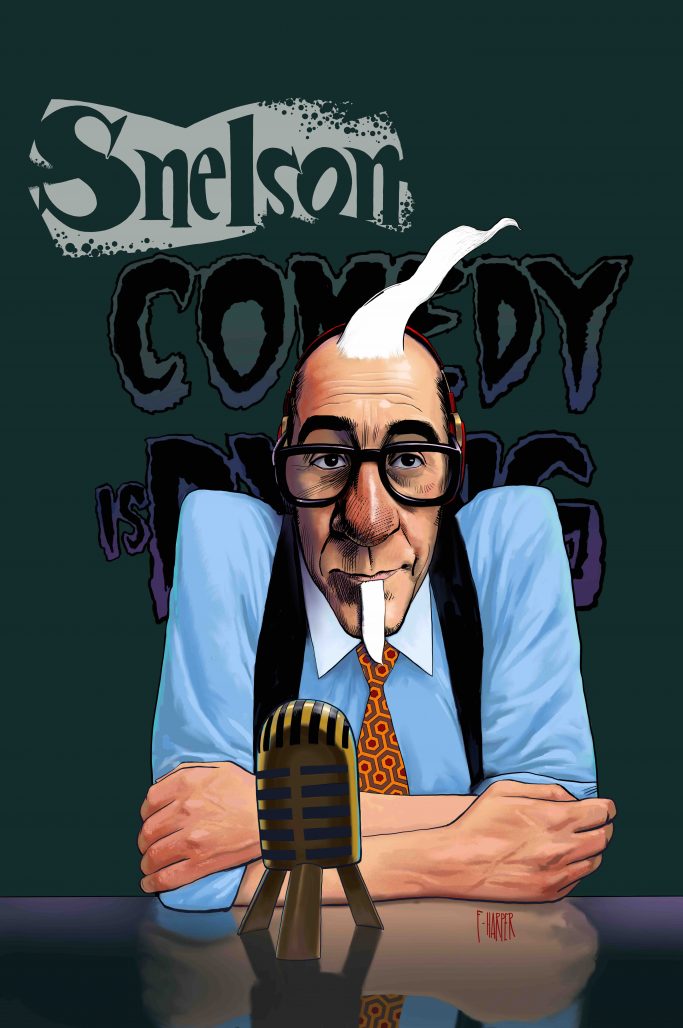
Aside from Bill Cosby and Harvey Weinstein, who faced real legal consequences for their abhorrent actions, I can’t really think of anyone who’s been permanently canceled. It’s a running gag in the series that people who have been canceled keep going onto larger and larger platforms to complain about how silenced they are. We see this all the time in real life, with aggrieved politicians and comedians making money while talking loudly into microphones to outraged fans about how silenced they are. Seems like a perfect target for satire, if you ask me. (And I think we may be the first comic book to name-check Bari Weiss, for whatever that’s worth.)
Grunenwald: You’ve teamed with Fred Harper and Lee Loughridge on this book. What’s your favorite thing that each of them has brought to the series?
Constant: I can’t imagine anyone but Fred Harper drawing this book. Snelson is a satire, but it’s also set squarely in the real world, so there are no mutant powers or alien worlds to make the most of the visual aspects of the medium. Fortunately, Fred’s art is its own special effect. He can take a scene of two people talking and blow it up visually with an amazing Sienkiewiczian expressionism that takes the internal lives of the characters and pulls them to the forefront of the scene. It’s caricature and its realism and it’s hyper-weird and it’s just masterful stuff.
When Fred’s gorgeous pages were coming in, I remember thinking to myself that I didn’t envy the colorist who had to match his energy, but Lee Loughridge rose to the challenge. He’s a perfect dancing partner for Fred—he imbues the realistic scenes with a fantastic energy, and he colors the fantasy sequences as though they’re realistic. Their interplay is amazing to watch.
Grunenwald: What do you hope readers take away from checking out Snelson: Comedy is Dying?
Constant: Ideally, I hope that readers come away feeling like they read a funny, interesting, drop-dead gorgeous comic book that was worth their time and money. And I also hope that readers will respond to and participate in the conversations we’re beginning the book, which I think are conversations that aren’t really happening anywhere else in comics.
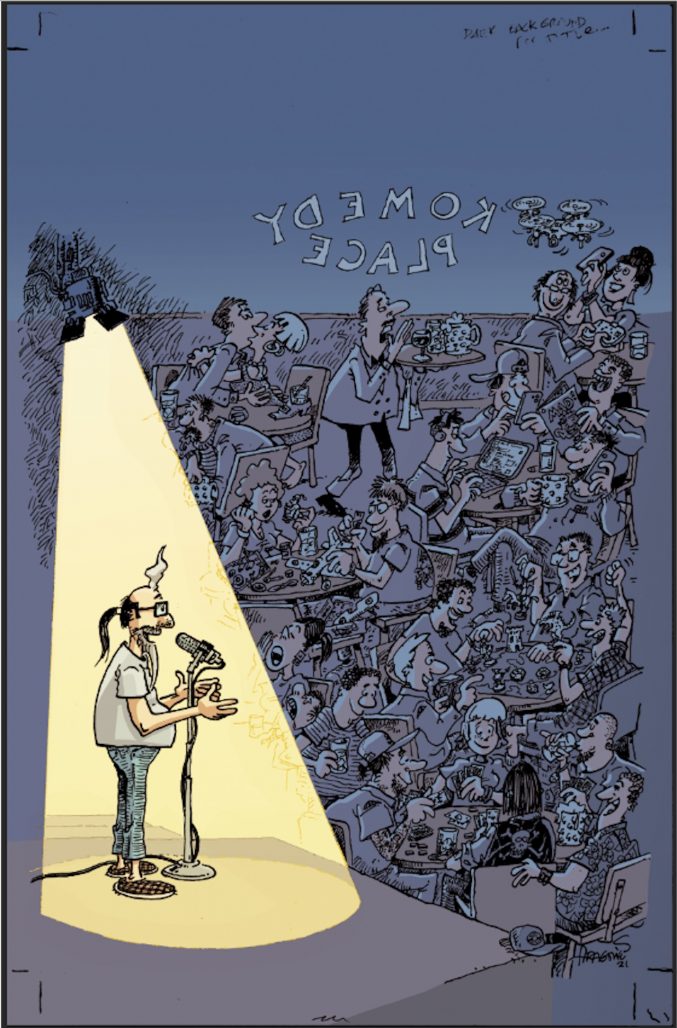
Grunenwald: Finally, do you have any updates on the Planet of the Nerds film adaptation?
Constant: I don’t think I can announce anything at this point, but one name that came up in conversation with Paramount Players was so thrilling, and so perfect for the gig, that it completely confirmed my belief that they really understand the book and what we were trying to do with it. It’s in great hands.
Published by AHOY Comics, Snelson: Comedy is Dying #1 (of 5) arrives in stores on Wednesday, August 4th. The preorder cutoff date for the debut issue is June 24th.



